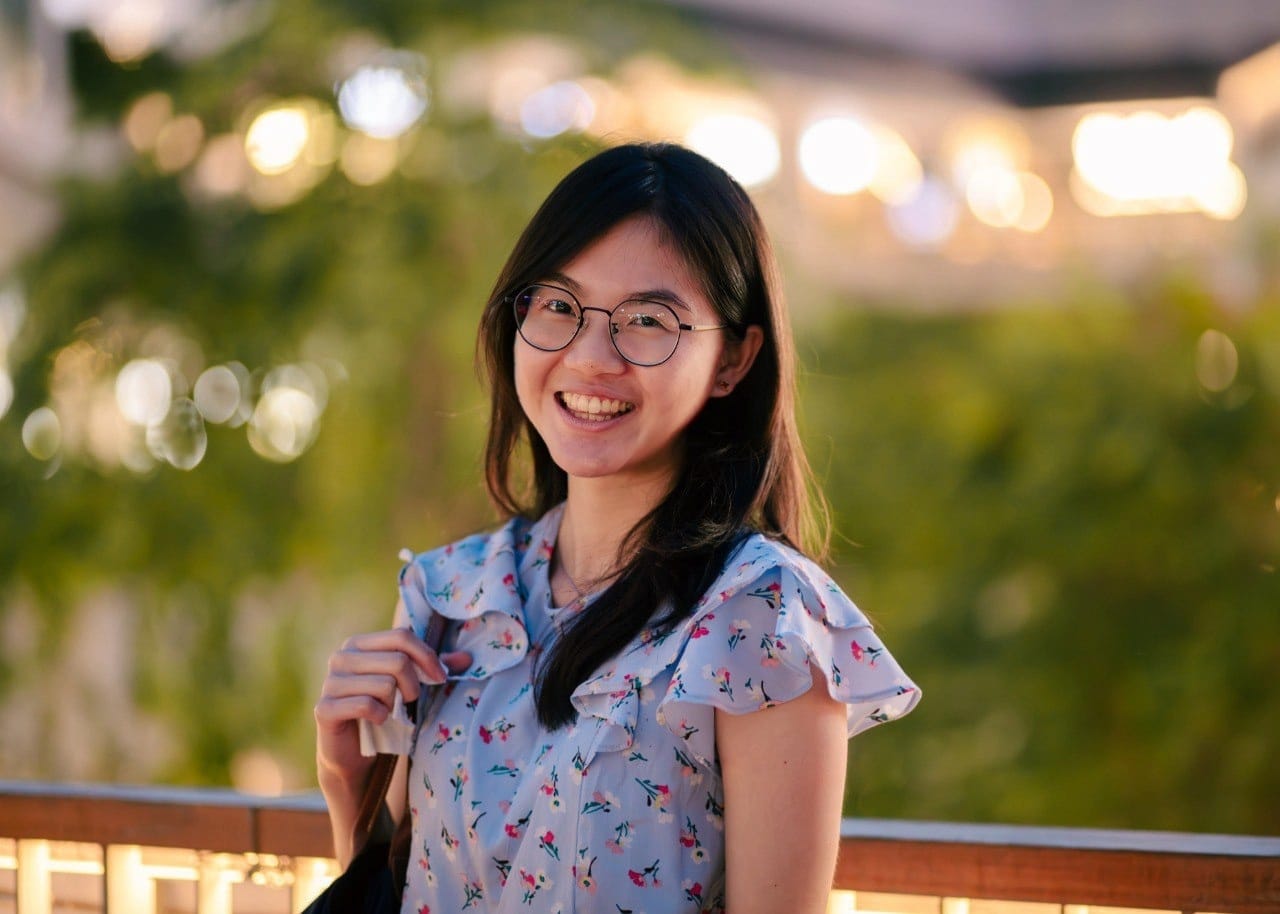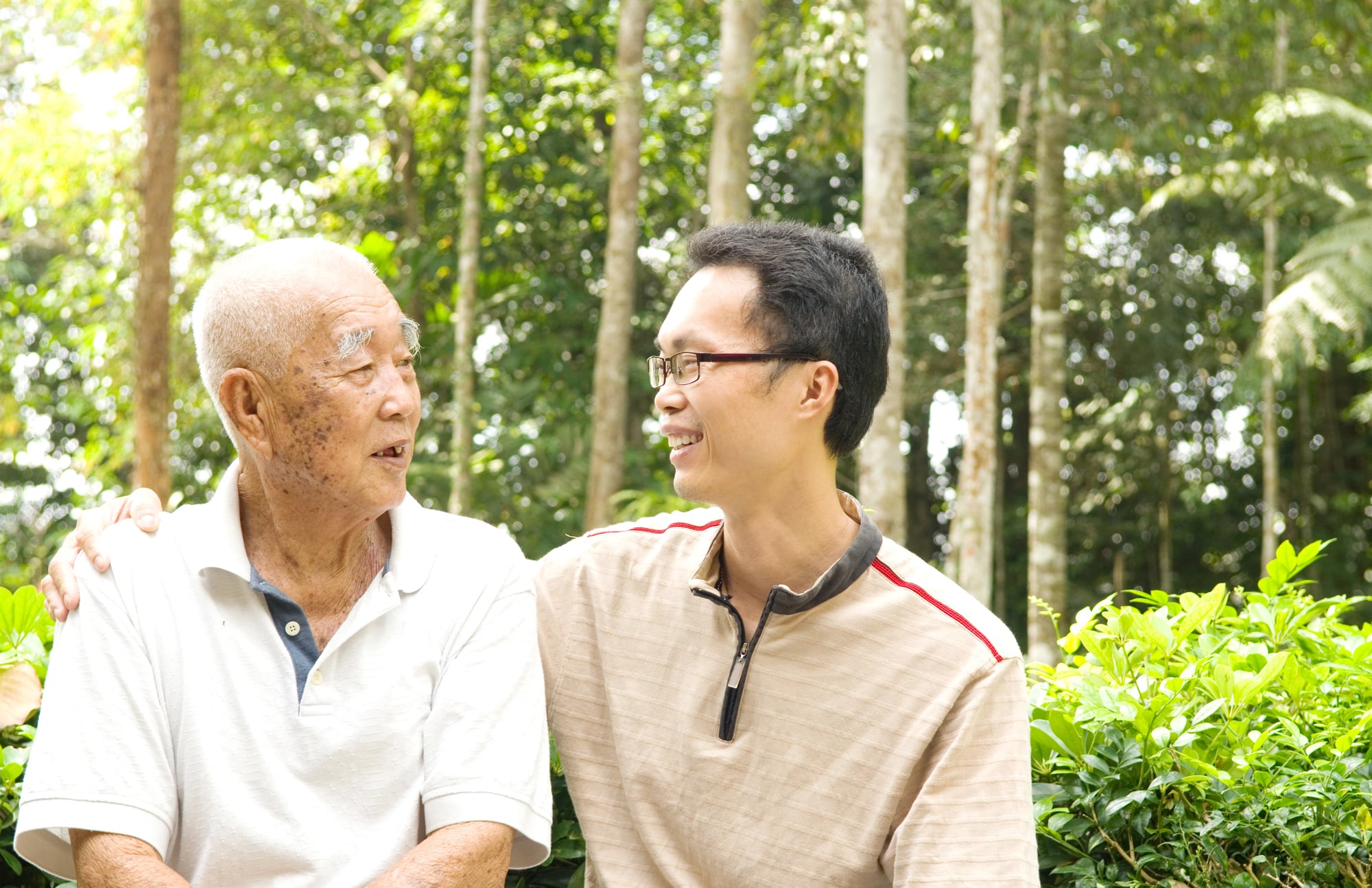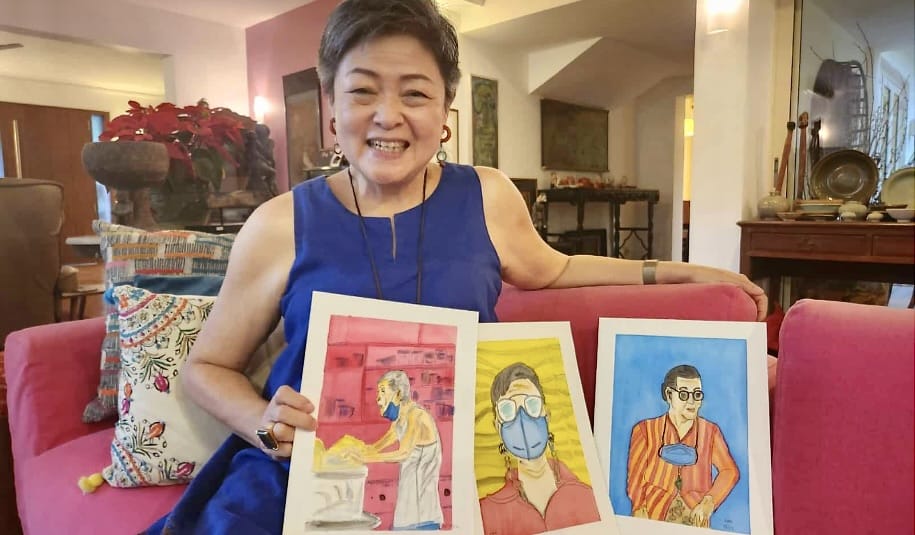Dr Cynthia Goh (1949-2022): Through her work with the dying, she taught many about living
by Juleen Shaw // February 21, 2022, 5:14 pm
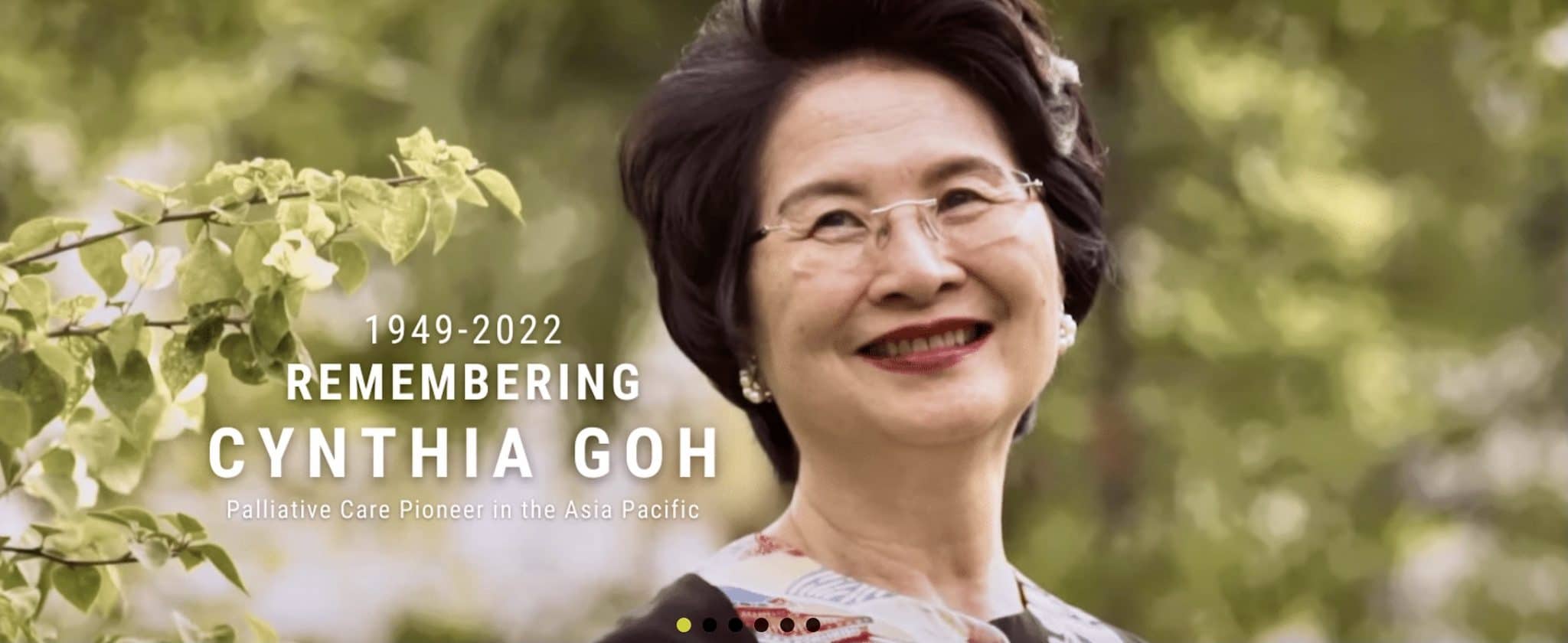
Dr Goh may have been "a perpetual masterclass in palliative care", but she taught as much through her compassion and faith as through her teaching. Photo from aphn.org.
They streamed in from Sri Lanka, Hong Kong, UK and even further afield to bid farewell to the doctor they called a trailblazer for palliative medicine and a woman of deep faith committed to her calling.
Up to 550 people joined the February 16 livestream funeral service of Dr Cynthia Goh, 72, who died peacefully on February 13 from pancreatic cancer. She is survived by her husband Dr Goh Hak-Su, 73, her son Dr Charles Goh, 44, his wife and two daughters.
“She taught me so much more than just medicine, but about life, how to treat people and how to truly care for patients.”
The news of Dr Goh’s passing saw tributes pouring in from palliative care communities around the world, an indication of the impact she made, not just in Singapore but globally, as she quietly but determinedly fought for 35 years to raise the profile of the oft-overlooked specialty of palliative medicine.
Many at the livestream funeral service, or who shared anecdotes of personal and professional encounters with Dr Goh on APHPCN’s Memory Wall, had been beneficiaries of her mentorship.
“She taught me so much more than just medicine, but about life, how to treat people and how to truly care for patients.” (Ian Wu)
“She was a perpetual masterclass in palliative care. Her inspiration, encouragement, kindness and strategic skills in all aspects of palliative care have helped my own journey in palliative care.” (Ednin Hamzah)
Their words of appreciation revealed how “Prof Goh” was more than a physician, colleague and teacher.
In her work with the dying, she taught many about living.
“What makes a good doctor?”
Dr Goh, whose maiden name was Cynthia Ruth Fung, was a fourth-generation Anglican, born in Hong Kong to a family of doctors.
On her first day in medical school at St Bartholomew’s Hospital, University of London, the lecturer had posed this question to the class: “What makes a good doctor?”
It was a question she would mull over for the rest of her life, shaping the philosophy of care she would eventually practise.
“She was meticulous, especially in listening to the patients with her heart.”
It was also in medical school that she met her future husband, Hak-Su, when she was a tender 20. Five years later, they married in 1974 and had a daughter and a son. The young family moved to Singapore in 1981.
Trained in internal medicine, with six years of full-time molecular biology research under her belt, Dr Goh became convinced of the need to improve the quality of life for the terminally ill through hospices and palliative care.
But in 1986 when she first broached the idea to health authorities, she found herself roundly rebuffed. There was no need for palliative care, came the reply time and again.
Undeterred, she volunteered her medical services at St Joseph’s Home, where there was another like-minded volunteer – Dr Anne Merriman, a British doctor who would later be known for her pioneering palliative work in Africa.
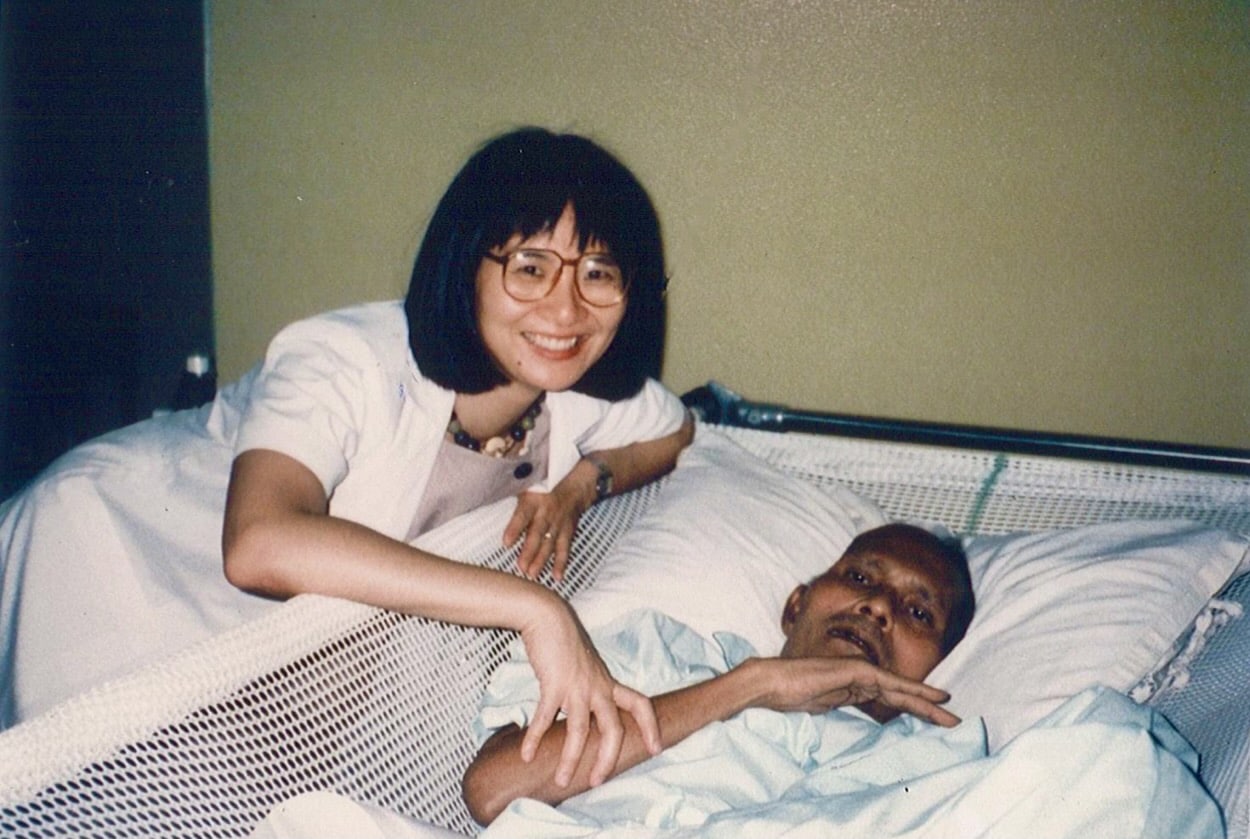
Dr Goh bringing solace to a patient at St Joseph’s Home in 1987, a year after the start of the hospice movement. Photo courtesy of Sr Geraldine.
Sister Geraldine, who now runs St Joseph’s Home, told Salt&Light: “I met Cynthia in July 1986 when she was introduced to me by Dr Merriman who described her as ‘a young, beautiful lady’ who was interested in palliative care and wished to volunteer to undertake patient rounds with her.
“My first impression of her was indeed very beautiful, full of energy, gentle, with the sweetest smile. She was a very warm person who made you feel at ease with her.
“Cynthia was very sharp with her clinical skills. She upheld the standard of care and was not afraid to correct us, all this done with the purpose of ensuring that we were properly trained to provide the best care to our residents.
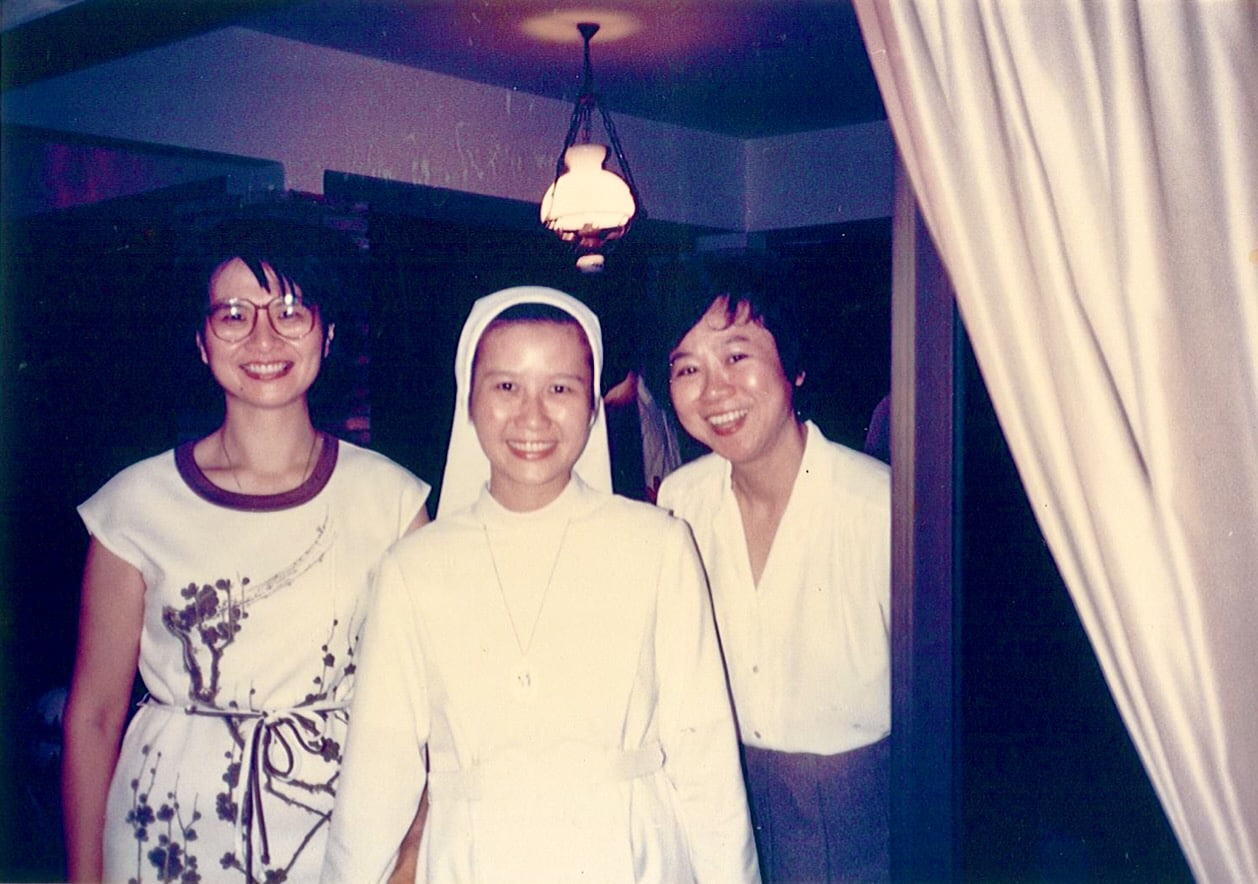
Dr Goh with Sister Geraldine and nurse volunteer Sister Lee Heng Lin in 1989. Photo courtesy of Sr Geraldine.
“One thing that struck me was her generosity to invest time in each person. She spent time taking down detailed history from patients. As she put it, ‘A good history is very important for you to know the patient, gain his trust and then build a bond with them.’ She was meticulous, especially in listening to the patients with her heart.”
As health services developed nation-wide, Dr Goh’s tireless efforts to recognise palliative care finally came to fruition.
She would go on to help set up the palliative department at Singapore General Hospital and National Cancer Centre Singapore in 1999, and become the founding president of HCA Hospice Care, Singapore’s largest home hospice care provider.
Another hard-won milestone: Together with a group of like-minded doctors, nurses and volunteers, she was instrumental in getting palliative medicine recognised as a medical subspecialty in Singapore in 2006, in line with UK and Australia.
Guiding light
But, to Dr Goh, that was only the start.
“Cynthia was a great visionary,” Dr Alethea Yee, Clinical Director at Assisi Hospice and Dr Goh’s colleague at the National Cancer Centre, told Salt&Light.
“She could see ahead the paths palliative care needed to take for the movement to have credibility and expand. For example she pushed for palliative medicine to be recognised as a specialty so as to train up a pipeline of doctors into this field. She understood that palliative care needed to be mainstreamed into medical practice if it was to gain support among the medical fraternity.”
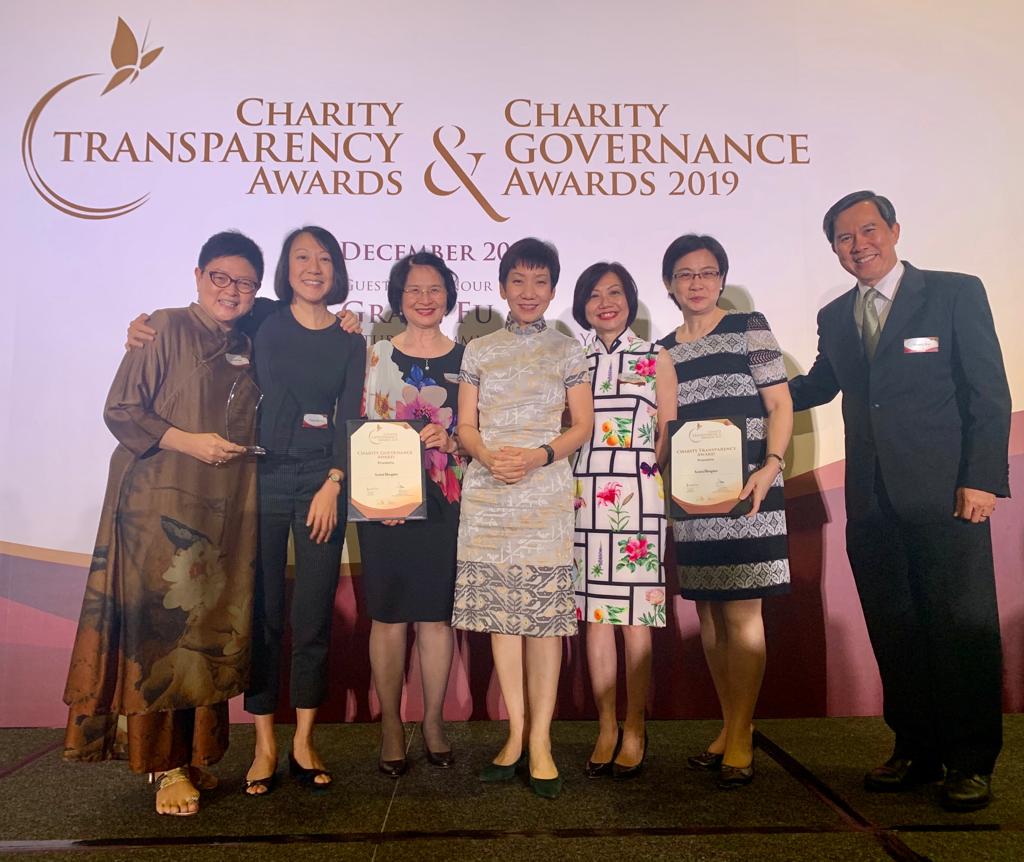
The Assisi Hospice team celebrating their 2019 Charity Governance Award for a Large Charity. The Charity Governance Award is the highest level charity award in Singapore. (L-R) Board Chairman Anita Fam, CEO Choo Shiu Ling, Dr Goh, Minister Grace Fu, CEO of Community Foundation of S’pore Catherine Loh, Finance Director Jennifer Lum and Board member Thomas Teo. Photo courtesy of Anita Fam.
Dr Goh’s work at Assisi Hospice as its Executive Director reflected the legacy she would leave wherever she made a footprint.
“She would say that if God offers an opportunity, we should not be afraid but just take it and learn along the way.”
“Cynthia impressed on me the critical need to stabilise, develop and increase the manpower situation in Assisi Hospice so that we could not only provide the level of care that our patients and their families needed, but as importantly, make it possible for our colleagues to enjoy their vocation as palliative care providers,” said Irene Chan, Executive Director at Assisi Hospice from 2007 to 2012. “Her focus was not on doctors alone but everyone in the palliative care ecosystem, especially nurses, social workers and counsellors.”
Her guiding light was “especially precious as she helped me navigate through extremely challenging times”, recalled Anita Fam, Chairman of the Assisi Hospice Board of Directors. “It was a time when we were overseeing the move from an old building to a brand new one and there was also a changeover in clinical leadership. She was my sounding board and a voice of reason through it all.
“Much of what Assisi Hospice is today is very much because of Cynthia’s strategic foresight, wisdom and leadership.”
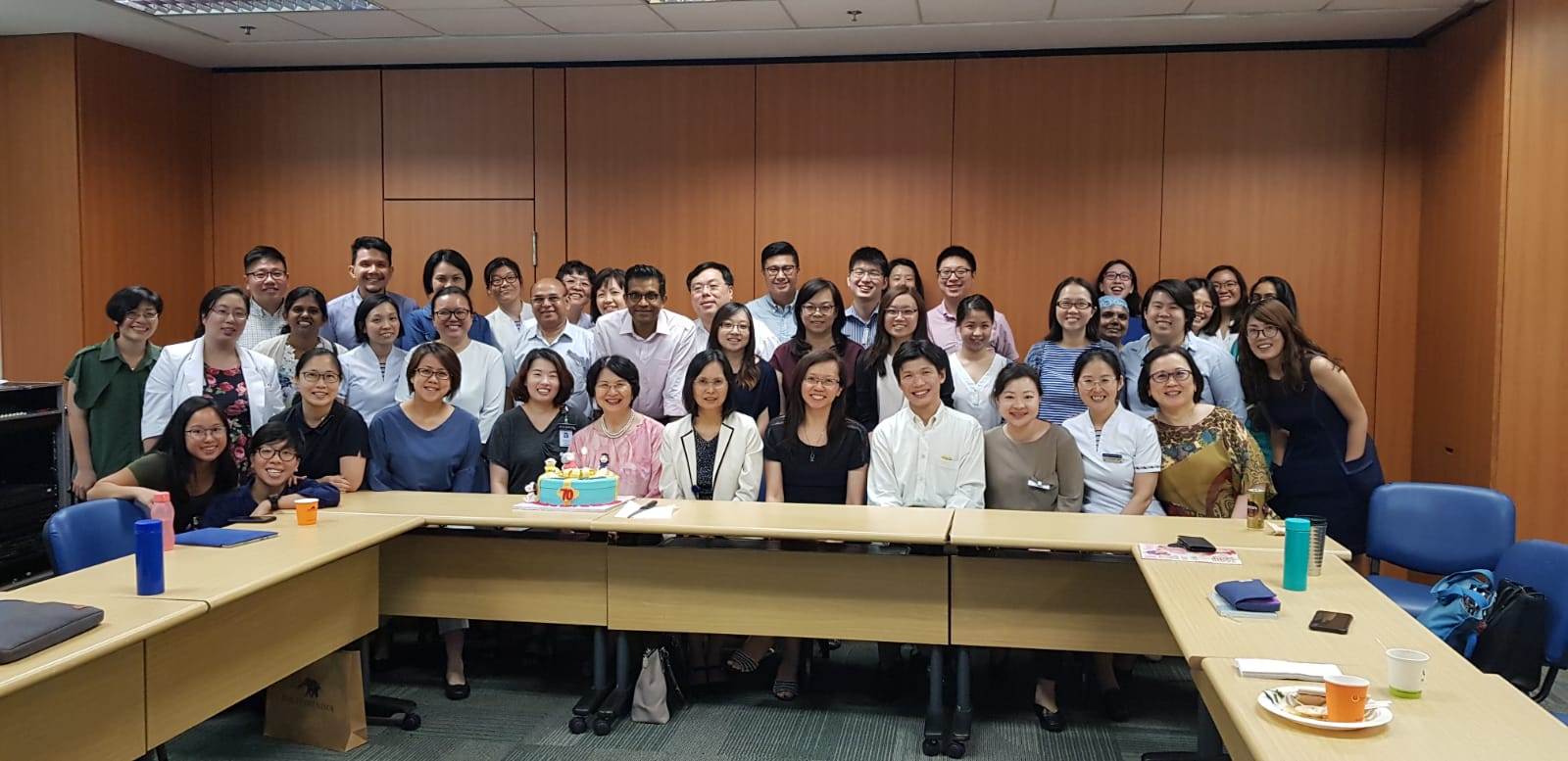
Dr Goh celebrating her 70th birthday in 2019 with the Division of Supportive and Palliative Care at NCCS. The division was founded by her in 1999 with just one consultant, one medical officer, one nurse and one secretary. In 2022, it has expanded to over 50 staff. Photo courtesy of Dr Yee (left of Dr Goh) who took over Dr Goh as HoD from 2011-2018.
That foresight was clear when the Lien Foundation stepped up to support palliative care. Dr Goh suggested setting up an academic centre in palliative care, the Lien Centre for Palliative Care (LCPC) at Duke-NUS, to inform best practice in a young field.
“It is tough to be compassionate, to be present in the darkness of those suffering in the shadowy valley of death and loss.”
Said Dr Yee: “She saw the urgent need to have quality palliative care training to build capacity and capabilities if we are to achieve universal access to palliative care. In a similar visionary way, Cynthia brought people together to form the Singapore Hospice Council, an umbrella body of palliative care services/organisations for advocacy work, and the Asia Pacific Hospice Network to advance the cause of palliative care in the region.
“She would say that if God offers an opportunity, we should not be afraid but just take it and learn along the way. I think it’s this faith in God and courage in the face of the unknown that led her to take the less travelled roads.”
On his travels with her to Bangladesh, Myanmar and Sri Lanka as part of the Lien Collaborative to train and inspire clinicians, Lien Foundation CEO Lee Poh Wah saw “a gifted healer and teacher who embodied the essence of palliative care”.
“It is tough to be compassionate, to be present in the darkness of those suffering in the shadowy valley of death and loss. Cynthia’s charisma came from her moral presence, feminine fortitude and gentle grace. I continue to draw strength from Cynthia and other innovators challenging the medicalisation of death, to deliver dignity to the dying and families.”
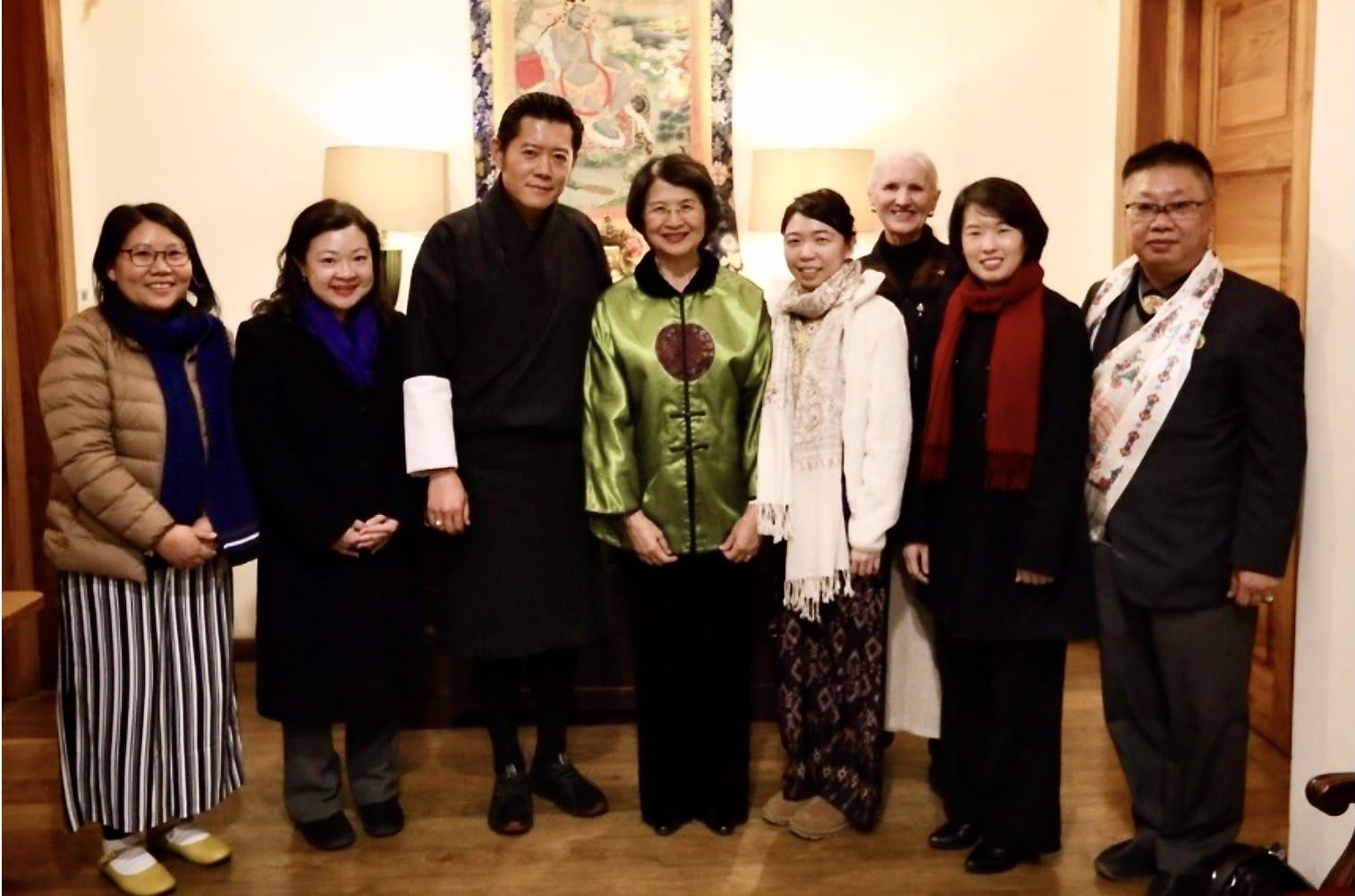
The APHN team with His Majesty the King of Bhutan, Jigme Khesar Namgyel Wangchuck (to Dr Goh’s right), on an LCPC Training of Trainers in Palliative Care trip in January 2019.
He credits Dr Goh as the prime mover of LCPC, which now works in concert with hospitals and health ministries in six countries, providing training for over 450 professionals.
Without setting out to, she put Singapore on the world palliative care map, not least through her mentorship within palliative care movements globally.
The digital APHN Memory Wall glows with well wishes from colleagues in India, Sri Lanka, Vietnam, Myanmar, Malaysia, Indonesia, Hong Kong, New Zealand, Taiwan, Philippines, Denmark, UK, US, Australia, Africa and beyond.
Appointments in multiple committees included chairing the Asia Pacific Hospice Palliative Care Network (APHN) from 2009 till 2021, when she moved to an advisory chair position.
Chocolate cake and handwritten cards
But it was the little things like chocolate cake that revealed Dr Goh’s generosity of spirit.
Sr Geraldine recalled: “I remember a patient who shared that she loved chocolate cake, and Cynthia brought her one the following day. The patient was so touched and from that day onwards she was The Doctor Who Made Me Feel Special.
“Patients and their families were often willing to wait hours to see her as they knew this doctor would give her 100% to them.”
“She was also very caring towards the staff of St Joseph’s Home. For years we would receive from her personally signed cards at Christmas which were attached to little gifts bought from her extensive travels.”
Dr Yee said: “Patients and their families were often willing to wait hours to see her as they knew this doctor would give her 100% to them.
“Two things she said in particular that shaped me into the palliative care physician I am today: Keep your eyes on the patient and you won’t go far wrong. And also: Our patients are our best teachers.
“She treats all patients equally and gives her best, regardless of social status, education level, race or religion. She has attended to the poorest of the poor and the richest of the rich and for all, she walks the extra mile.”
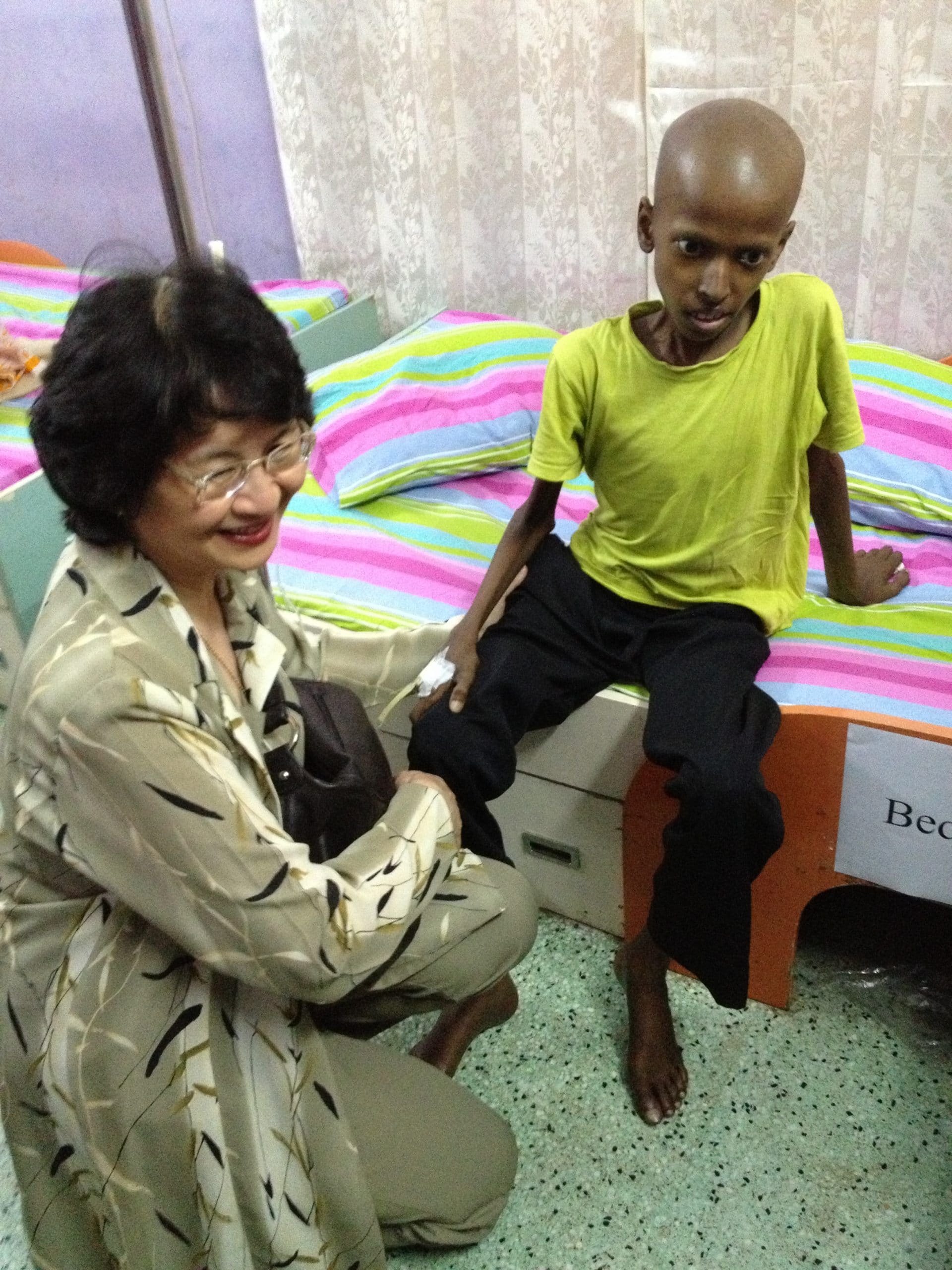
In Dhaka, 2012, on an LCPC visit. Photo courtesy of Lee Poh Wah.
Ms Chan added: “When I was reflecting on my memories of Cynthia, surprisingly (what came to mind) was not about work but her family. Cynthia rarely stayed for dinners after our Board meetings as she said that she was going to have dinner at home with her husband. And while chatting about her son’s wedding months after her trip to Ireland, beaming with joy she whipped out a photo album of the wedding from her big handbag. She certainly carried her family close to her in her heart and bag!”
Many left anecdotes on the APHN Memory Wall:
“When I was a fledgling registrar I took the Communications and Wales GDPM exams in your office. I took it for granted at that time but now looking back you must have made lots of arrangements to make it happen. Thanks for lending me your fridge and hosting the viva of the exam on your speaker phone.” (Angeline Seah)
“She has attended to the poorest of the poor and the richest of the rich and for all, she walks the extra mile.”
“Not many are aware but when I interviewed for a position with Duke-NUS in 2009, Dr Goh was one of the people who interviewed me. Instead of a typical interview she took the time to take me out for a fantastic lunch on Orchard Road.” (Eric Finkelstein)
Perhaps the most poignant was a rare glimpse of the young Cynthia, as provided by her sister-in-law, Sophia Goh:
“After their marriage 48 years ago in Hong Kong, Hak Su brought Cynthia home to meet our parents in a small fishing village in Sarawak. It was a totally new experience for Cynthia (in terms of) social and cultural ambience, but throughout her stay, she ate what the locals ate – small, bony fish – bathed from well water and hitched a motorcycle ride when she went downtown. That was the way of life.
“A week later, they left – not a word of complaint from Cynthia but a smile that’s forever etched in our heart as we cherish the loving memory of her affable, enduring, and respectful nature.
“The return journey would take three days by a rickety bus, then transferred to a steam-engine supply boat, a longboat and finally a flight back to Singapore and then London to start their house jobs.
“I last met Cynthia before the Covid-19 pandemic. She just came back from work, she settled down for dinner. It was midnight – still not a word of complaint – but, as always, a reassuring smile. I will always remember this great lady with affection and admiration.“
Faith in life, faith to the end
When Dr Goh became terminally ill, her life’s work in palliative care took a personal turn.
Life came full circle when Dr Yee, who had been inspired by Dr Goh to take up palliative medicine more than 20 years ago, became Dr Goh’s palliative doctor who would see her through to her final breath.
“Requests for prayers were part of her nature. She believed that nothing is impossible for God if it is His will.”
“When Cynthia was diagnosed with pancreatic cancer, which we all knew deep down was a type of cancer that has poor prognosis, I asked her how she felt about her illness,” said Dr Yee. “She shared that she was at peace with it and accepted it as her destiny, for to her, when and how one dies is written in God’s hands.
“Cynthia had a bucket list of things to do and she went about it in a purposeful manner to complete those that mattered most to her in the limited time she had. Her symptoms were challenging to control and it took many hands to control them.
“Two days before she passed away, she told me that she had done all that she set out to do and that she was ready to meet her Maker. She indicated that being alert was no longer important and this allowed us to titrate the medications to palliate her breathlessness in the way that was acceptable to her. Right to the end, she was in control of how she lived and died, and our role was to respect her choices, values and personhood as we journeyed with her.’
“Throughout her illness journey to her death, she demonstrated remarkable faith, courage, dignity and great sense of humour. Ever the teacher, she would frequently share her experience as a patient with us as teaching moments.
“When we work in this field, we face death constantly and it challenges us to think about our own mortality too. To be honest, Cynthia’s terminal illness cut very close to home and I’m not sure I will have as much faith and courage as her if I’m facing death, but Cynthia has shown us how we can walk our path with our eyes focused on God and trusting Him to the end.”
Ms Fam said Dr Goh’s final days epitomised the beauty of palliative care, where she could talk about her plans openly and calmly, knowing she was going into the presence of the Lord whom she loved.
Dr Goh’s faith underpinned her life, agreed Mr Lee.
“In a world grasping for purpose and meaning, she taught us the importance of recognising our shared humanity.”
“Cynthia was a crusading champion of palliative care whose fidelity to the mission over a lifetime was driven by her deep faith and an unwavering devotion to her ideals.
“In a world grasping for purpose and meaning, she taught us the importance of recognising our shared humanity.”
Her faith was her guiding light, said Sr Geraldine. “She walked her talk and was a faithful disciple of Christ, adhering to Micah 6:8: Act justly, love tenderly and walk humbly with God. Requests for prayers were part of her nature. She believed that nothing is impossible for God if it is His will.
“During her illness, she was very calm and lived a day at a time enjoying nature – walking in the garden, listening to birds and waiting patiently for the unfolding of His Will one day at a time as her illness progressed.
“Her last request on the morning of February 13 was, ‘Please be with me when I take my last breath.’ What a privilege to be invited to this sacred space where God received this kind soul who has worked tirelessly in His vineyard.
“Cynthia passed away very peacefully embraced by her beloved spouse and among her loved ones, colleagues and friends. And many were praying for her all over the world too.
“It is reassuring that Cynthia has done much and is now resting with God. (Hebrews 4:1) God has offered to us the same promise of entering into his realms of resting in confident faith.”
A Postscript
“May I have a PDF version of Rana’s story?” came the text from Dr Cynthia Goh, a few days after the story was published in Salt&Light on June 5, 2020. “My daughter-in-law has requested me to keep a memento box for my two little granddaughters, now aged 7 and 4, and I thought a copy of the article would be a good thing to keep for them.”
“It was a miracle”: Dr Cynthia Goh on the chain of goodness that led Bangladeshi worker home
I had forgotten this little bit of communication between us. But, as I scrolled through our Whatsapp texts in preparation for writing this memoriam, Dr Goh’s seemingly inconsequential request epitomised for me her spirit: Nothing she did was meant to be kept for herself but always to be passed on for the edification of others.
This explains her most common descriptor by scores of well wishers who remember “Prof Goh” as “an inspiring teacher”.
“I want you to not only know everything about the patient medically, I want you to know what matters to him.”
To hear how Cynthia’s story unfolded, told in her own words during our interview in 2020, was riveting:
“As a medical student, I remember the first day I walked into the wards in my hospital, I was attached to a team led by a gynaecologist, and he said to us, ‘You are the spiritual directors of all your patients. I want you to not only know everything about the patient medically, I want you to know what matters to him, what his life is like, what his family is about. Everything is relevant.’ That really was etched into our minds.
“So after I did my first postgraduate exam, I said to myself, well, what sort of specialist am I going to be? And hospice and palliative care was something that I felt was going to enable me to practise medicine the way I thought it ought to be practised.
“Of course, it didn’t exist in Singapore then. So I was told, ‘Oh don’t be so silly, go into a proper specialty! Do this on the side, this is your volunteer stuff.’ And of course, I never take good advice; I just ignored that!
“I spent six years being a full-time researcher in molecular biology. In 1986, the year that I joined the Institute of Molecular and Cell Biology, was the year we started the hospice movement here in Singapore. And, because I was working in the lab, my time was my own. So I used to do my lab work in the middle of the night, worked during the day as a volunteer to help build the hospice movement, and in the evening, I was at home looking after my kids, my husband and everything else. So I had sort of three lives in those days. But that was how we started the hospice movement in Singapore – as volunteer doctors, nurses and laypeople.
“I was told, ‘Oh don’t be so silly, go into a proper specialty! Do this on the side, this is your volunteer stuff.'”
“My peers had warned me that if I went into this specialty, nobody would give me a job at the end of my PhD, and it was true. When I completed my PhD in 1992, I went back to my original employer, and they said, ‘Oh, I have five vacancies but I don’t have a vacancy for palliative care.’
“I had no job. So I volunteered for two years with HCA as a president, and provided care as a volunteer medical director under Dr Rosalie Shaw. That was where I was first grounded, and by the time I finished, we had three medical doctor positions in HCA.
“My first paid job in palliative care was as Medical Director of Assisi Hospice to help build up their inpatient service and their home care service. I worked there for nearly five years. And by 1999, the National Cancer Centre was starting up. I went to the director designate at that time, and I said to him, ‘Look, if you want to be a comprehensive cancer center, you’ve got to have, not only radiation oncology, medical oncology, surgical oncology, but also palliative medicine.
“He went off to visit all these established cancer centres, and lo and behold, they all had a department of palliative medicine. So when he came back, he said, ‘Oh, we need one too.” Rosalie started a department of palliative medicine in KKH and I in SGH.
“But Rosalie and I were not getting any younger. Every time we attracted young doctors who were inspired to come into palliative care and they got trained, they were poached from us. And I thought: The only way we could do it is to establish palliative medicine as a specialty in the public sector.
“I don’t think that we could have established anything like that if it hadn’t been God’s idea in the first place.”
“Six years later, we managed to do that, and we started training our specialists. Now we have over 60 specialists registered with the S’pore Medical Council. The whole thing is sustainable.
“And when Covid struck, we went in and established palliative care in the ICUs. Our services decanted a lot of patients from hospitals so that their beds could be converted into Covid beds. So we’re very much integrated as part of the Singapore healthcare service.
“We’re very, very lucky here in that, because Singapore is small, we can establish this. In so many other countries you think of the amount of suffering that cancer patients have, where not only do they not have palliative care, they don’t even have pain management. We’re talking about millions of people.
“When I started at St Joseph’s Home with Sr Geraldine, an oncology trained nurse who became a nun, we wanted to start with the right values: We were not going to turn anybody away in home care. Eventually the sisters said, ‘We think that hospice care is too important for it to be associated with a particular religion. You need to start a secular association so that it can reach the whole of the Singapore population. So we started HCA, which was non-denominational.
“I believe that where there is tremendous suffering – particularly suffering that is not within our power to alleviate – Christ is always there.”
“I don’t think that we could have established anything like that if it hadn’t been God’s idea in the first place. There were so many touching stories in our journey through this. God has provided for all we did. Every step of the way, it was taking a step in faith. And then God just coughed up the resources!
“Even in Assisi, how did we think we’d be able to raise that kind of funds for a new hospice? But we knew that, if this was something that God intended, then it would happen. And I was also very content that, if it was something that God hadn’t intended, it shouldn’t happen.
“Matthew 25:40 is about looking after the stranger, and seeing in the stranger the face of Christ. This is something that I’ve always found true in palliative care because we see so much suffering. People very often say to me, ‘How do you cope with it? How do you do this all the time?’
“For me, the secret is that I believe that where there is tremendous suffering – particularly suffering that is not within our power to alleviate – Christ is always there. Because he has suffered, He knows what it’s like. It doesn’t matter whether that person is Christian or not, our being present there is the presence of Christ to them.”
When I heard about Dr Goh’s passing on the evening of February 13, I was filled with regret for not having written her dramatic story, not just of human effort but of God’s divine grace. It was a story I had intended to write for World Hospice and Palliative Care Day come October 8.
But over the past week of hearing the moving accounts of those who laboured and lived alongside her, accounts of her formidable clinical/teaching prowess and her even more formidable depth of compassion, I realised this: Dr Cynthia Goh did not need more words to underscore the value of dignifying palliative care. She had already told the story through her life.
RELATED STORIES:
The gifts in the valley: How God shepherded a pastor’s soul after his wife died
Breaking the silence: A foreign domestic worker and rape survivor’s story of healing
“We were meant to be here”: SARS doctor who arrived in Singapore just before the outbreak
We are an independent, non-profit organisation that relies on the generosity of our readers, such as yourself, to continue serving the kingdom. Every dollar donated goes directly back into our editorial coverage.
Would you consider partnering with us in our kingdom work by supporting us financially, either as a one-off donation, or a recurring pledge?
Support Salt&Light